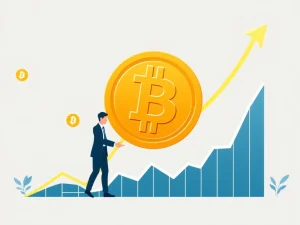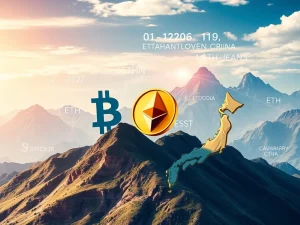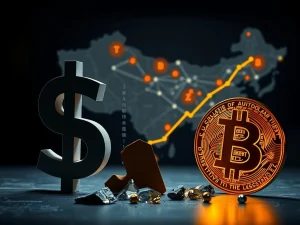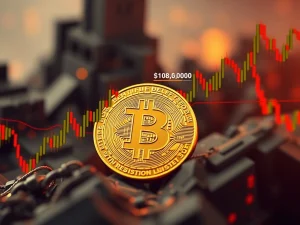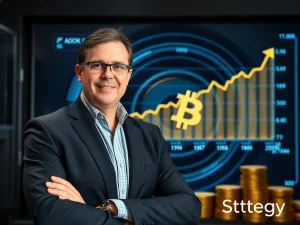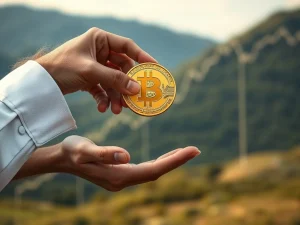Bitcoin ETFs: Kiyosaki’s Urgent Warning Amidst Record Inflows
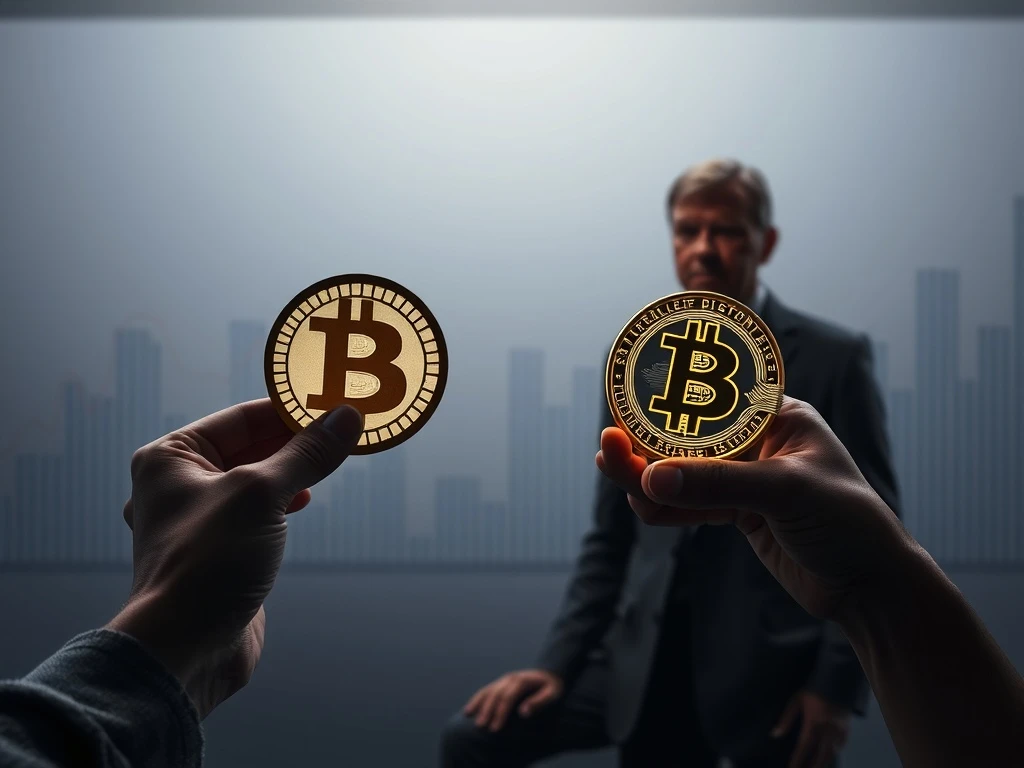
In the dynamic world of digital assets, few topics spark as much debate as the nature of ownership. Recently, financial guru Robert Kiyosaki, author of ‘Rich Dad Poor Dad’, reignited this discussion with a potent **Kiyosaki warning** about **Bitcoin ETFs**. His message is clear: these popular investment vehicles are merely ‘paper versions’ of the real thing, a stark contrast to the significant inflows seen in the U.S. spot Bitcoin ETF market. As investors flock to the convenience of these funds, Kiyosaki urges a deeper look at what true asset control entails.
What’s Behind Kiyosaki’s Urgent Warning on Bitcoin ETFs?
Robert Kiyosaki has consistently voiced his skepticism regarding exchange-traded funds (ETFs) for Bitcoin and precious metals. His core argument centers on the lack of physical possession. Kiyosaki likens owning an ETF to having ‘a picture of a gun’ for self-defense – effective in calm times, but useless in a crisis. He contends that financial instruments like **Bitcoin ETFs** offer no direct control over the underlying asset. Should institutional failures or liquidity crunches occur, these paper claims could become worthless. Kiyosaki’s philosophy champions direct ownership of tangible assets, such as physical Bitcoin, gold, or silver, as the ultimate safeguard against inflation and the devaluation of fiat currencies. He points to historical examples of bank runs and institutional collapses to underscore the risks of relying on intermediaries for asset security.
Bitcoin ETFs vs. Direct Bitcoin Ownership: The Great Debate
Despite Kiyosaki’s cautionary stance, the U.S. spot Bitcoin ETF market has witnessed considerable activity. On July 25, 2025, these ETFs recorded net inflows of $226.6 million, rebounding from earlier outflows of $280 million. This trend highlights a growing demand for ETFs, especially among retail investors drawn to their simplicity and lower barriers to entry compared to managing physical assets or digital wallets. However, Kiyosaki maintains that this convenience comes at the expense of genuine **asset control**, viewing ETFs as mere contracts rather than the assets themselves.
Bloomberg senior analyst Eric Balchunas offers a counter-perspective, arguing that concerns about ETFs are often overstated. He emphasizes regulatory safeguards, such as the legal requirement for ETFs to maintain a one-to-one ratio with their underlying assets. Balchunas also points to the ETF sector’s 30-year track record of operational stability, contrasting it with the inherent volatility of crypto and precious metals markets. While acknowledging the crypto community’s distrust of traditional finance, he also highlights risks associated with self-custody of Bitcoin and physical gold, including theft and high storage costs.
Navigating Crypto Investment: Weighing Convenience Against Control
The debate over ETFs reflects a fundamental ideological divide between proponents of decentralized finance and traditional financial systems. While ETFs have undeniably democratized access to digital and physical assets, critics like Kiyosaki remain unconvinced, advocating for **direct Bitcoin ownership** as the only reliable hedge in times of economic uncertainty. His arguments resonate with investors who prioritize autonomy over convenience, even as ETFs gain mainstream adoption.
The recent surge in inflows into Bitcoin ETFs suggests a market preference for simplicity and accessibility. However, Kiyosaki’s stance underscores the potential vulnerabilities of synthetic products in uncertain environments. This ongoing discussion isn’t new; debates over physical versus synthetic ownership have a long history. Kiyosaki consistently promotes direct holding, anticipating superior outcomes in crisis scenarios. Meanwhile, record inflows into gold and silver ETFs, alongside positive trends in Ethereum ETFs, indicate a broader shift toward asset-backed financial instruments.
Beyond the Hype: Practical Insights for Asset Control
Kiyosaki’s warnings have gained traction amidst heightened market volatility and growing interest in alternative assets. However, experts caution that his perspective may not align with all investors. For instance, retail investors who lack the resources to secure physical assets or navigate the complexities of self-custody may find regulated ETFs a more practical and safer option. The discourse highlights the need for investors to carefully weigh the trade-offs between accessibility, control, and risk when making their **crypto investment** decisions. Understanding these nuances is crucial for navigating the evolving landscape of digital asset ownership.
In conclusion, the ongoing tug-of-war between Kiyosaki’s warnings about ‘paper Bitcoin’ and the robust inflows into **Bitcoin ETFs** reflects a critical juncture in the world of crypto investment. While the convenience and regulatory framework of ETFs appeal to a broad audience, Kiyosaki’s emphasis on direct ownership serves as a powerful reminder of the fundamental principles of **asset control**. Ultimately, the choice between direct holdings and ETF exposure depends on individual risk tolerance, financial goals, and the perceived stability of the broader economic environment. Informed decisions, grounded in a clear understanding of both the benefits and risks, remain paramount for any investor navigating this complex terrain.
Frequently Asked Questions (FAQs)
1. What is Robert Kiyosaki’s main concern about Bitcoin ETFs?
Robert Kiyosaki’s primary concern is that Bitcoin ETFs are ‘paper versions’ of the actual asset. He argues that they do not provide physical possession or direct control over Bitcoin, making them vulnerable to systemic risks like institutional failures or liquidity crises, which could render them worthless.
2. How do Bitcoin ETFs differ from direct Bitcoin ownership?
Bitcoin ETFs allow investors to gain exposure to Bitcoin’s price movements without directly owning or managing the cryptocurrency. Direct Bitcoin ownership involves holding Bitcoin in a personal wallet, giving the investor full control over their assets. ETFs offer convenience and accessibility, while direct ownership provides true asset control and removes third-party risk.
3. What are the advantages of investing in Bitcoin ETFs?
Advantages of Bitcoin ETFs include ease of access through traditional brokerage accounts, simplified tax reporting, and often lower barriers to entry compared to managing digital wallets. They also offer regulatory safeguards, as they are typically required to maintain a one-to-one ratio with their underlying assets.
4. What are the risks associated with direct Bitcoin ownership?
Direct Bitcoin ownership carries risks such as the potential for theft (if private keys are compromised), loss of funds due to forgotten passwords or hardware failures, and the complexities of secure self-custody. It also requires a higher degree of technical knowledge to manage wallets safely.
5. Why are investors still flocking to Bitcoin ETFs despite Kiyosaki’s warnings?
Investors are drawn to Bitcoin ETFs primarily for their convenience, accessibility, and the perception of lower risk due to regulatory oversight. Many retail investors prefer the simplicity of investing through traditional financial platforms rather than navigating the complexities of self-custody or managing digital wallets.
6. What should investors consider when choosing between Bitcoin ETFs and direct ownership?
Investors should weigh factors such as their comfort level with technology, risk tolerance, desire for control, and financial resources. Those prioritizing convenience and regulatory protection might opt for ETFs, while those valuing ultimate asset control and independence from financial intermediaries might prefer direct Bitcoin ownership.

